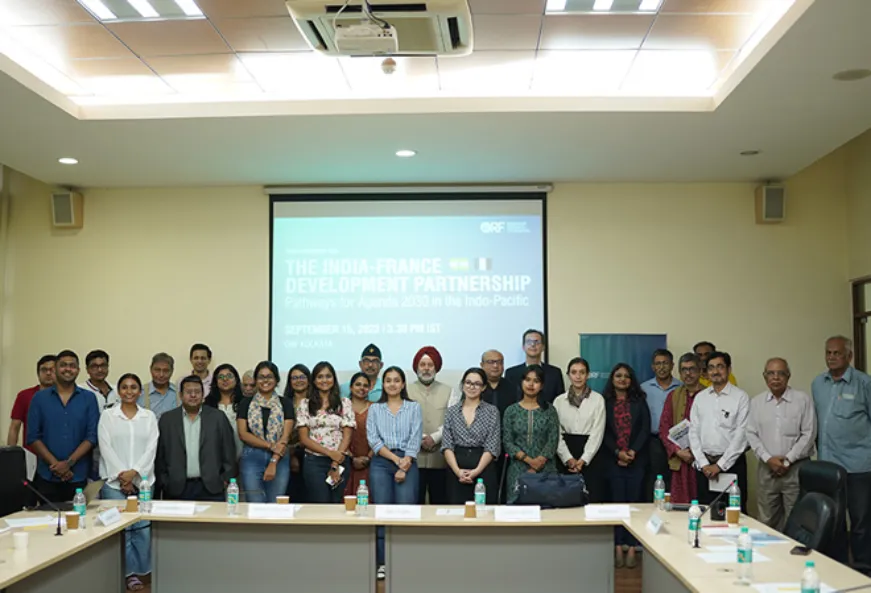-
CENTRES
Progammes & Centres
Location

As a new geographic hotspot for sustainable development, the Indo-Pacific has gradually become the strategic reality of the 21st century. Here, India and France are resident powers and close allies with common stakes. As bilateral trade partners sharing values of democracy and belief in multilateralism, the Indo-French strategic partnership is significant for this region. As the partnership completes 25 years, the two countries are keen to strengthen their cooperation towards Agenda 2030, as laid out in the ambitious, 'India-France Indo Pacific Roadmap' under 'Horizon 2047'.
In this backdrop, the Observer Research Foundation (ORF), Kolkata organised an hour-long panel discussion on “The India- France Development Partnership: Pathways for Agenda 2030 in the Indo-Pacific" on 15 September 2023, as part of the Friday Afternoon Talk (FAT) Series. The panel comprised Manjeev Singh Puri, Distinguished Fellow, TERI, former Indian Ambassador to EU, Belgium, Nepal, Luxembourg & Deputy PR of India to the UN; Laurent Cortese, Head of Climate Finance and Energy, AFD, India; Antara Ray, Director, Cities & Resilience, PwC India; Pratnashree Basu, Associate Fellow, ORF. The discussion was moderated by Dr Swati Prabhu, Associate Fellow, ORF.
Dr Nilanjan Ghosh, Director, Centre for New Economic Diplomacy (CNED) and ORF Kolkata set the context with his opening remarks highlighting how development partnerships are the cornerstone of diplomacy across the globe. When looked at critically, they also turn out to be the stepping stone for achieving sustainable development on a global scale, as enlisted in Sustainable Development Goal (SDG) 17. Dr Ghosh also shed light on how India's G20 presidency allows it to contribute and lead the post-pandemic global development narrative. Though discussions on bilateral trade have been consistent, the lack of development financing continues to be a bottleneck. The developing countries of the Indo-Pacific face a deficit of trillions of dollars to achieve the sustainability targets. With their shared interests in this region and the need for devising innovative financing instruments and institutional mechanisms, it would be interesting to see how India and France shape the development narrative, given their 25-year-old association.
The panellists highlighted how French presence in the Indian Ocean justifies its territorial interest in India. As a result, India and France have formulated several mutually beneficial defence, climate, economic, maritime, and civil nuclear cooperation agreements throughout their strategic partnership. In fact, France seeks to partner with India owing to the geopolitical similarities and the shared development agenda. The diplomatic relation between the two is at its peak and the time is ripe for a policy dialogue furthering the conversation on partnerships to support sovereign efforts and also to tackle the development challenges with a focus on sustainability.
Talking about development diplomacy, the discussion also highlighted how this tool can potentially cater to the larger global good and offers a roadmap for achieving the desired development goals. It is an important dimension of international politics, one which sits between foreign policy and development cooperation. This is particularly vital for several countries of the Global South that lack the wherewithal and access to resources and finance. It also came to the fore that the accommodation of geostrategic and geoeconomic interests and concerns is integral to establishing development partnerships. Given the successful Indian G20 presidency, development cooperation for New Delhi has emerged as a vital instrument to connect with many of the low-income and small island developing states (SIDS), thereby creating a bridge between the Global North and South.
The discussion further delved into the kind of development cooperation models and their linkages to climate financing. For instance, countries from Southeast Asia are considered to be large economies by global standards and are believed to grow into even larger economies. It is essential that these economies focus on capital generation and sign up for more green projects to facilitate better funding. That being said, there is an undeniable tussle of how one defines green projects, which results in further delay of development initiatives and stagnant progress in achieving the SDGs in these developing economies. Thus, there is a lacuna in the field of start-up financing. Another thing that keeps developing countries from achieving the desired SDG is the challenge of curating accurate data, its magnitude, and analysis. Moreover, India and France are also deeply involved in the field of data analysis using satellite technologies.
The panellists also underlined the dilemma faced by the Indo-Pacific- adapting and responding to the developments within the region and devising approaches to suitably utilise external investment and financing coming into the region. Furthermore, the discussion reflected on the importance of identifying and acknowledging the interlinkages between sustainability and the geopolitical context. Like-minded countries like India and France must formulate a roadmap, much like Horizon 2047, charting the course for the next 25 years concerning sustainable finance and deepening bilateral relations in all sectoral areas.
This event report is written by Khushi Singh, Research Intern, Outreach and Communication at Observer Research Foundation.
The views expressed above belong to the author(s). ORF research and analyses now available on Telegram! Click here to access our curated content — blogs, longforms and interviews.